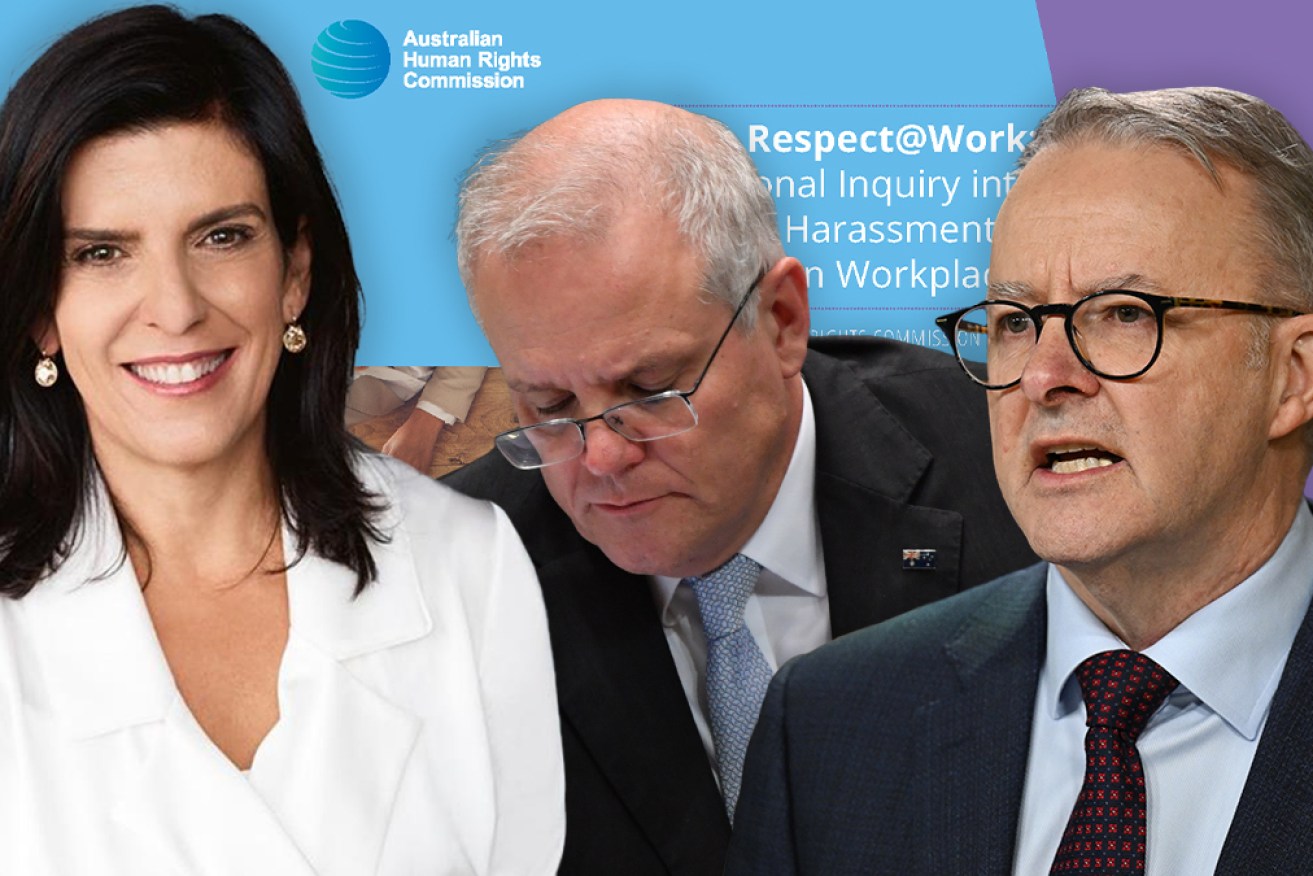Julia Banks: Respect at Work law will change our culture


The difference in reaction to Kate Jenkins' report from the Morrison and Albanese governments has been marked, writes Julia Banks. Photo: AAP/TND
When Senator Penny Wong introduced our new Prime Minister, Anthony Albanese, on election night she said, “Australians had chosen change” and had chosen a “government for women”.
There was an overwhelming emotional reaction around the country: It marked the end of the Morrison government’s term in office which was characterised by a breathtaking lack of respect for women.
Among the new government’s commitments which aim to ensure the full equality for women – many of which have been incorporated in the budget – was a commitment to implement all 55 recommendations of the Respect at Work report, including the integral positive duty on the employer, which shifts the burden from the employee to the employer. It is a powerful tool that puts the onus on the employer to take steps and set up structures to prevent sexual harassment.

The Albanese government has committed to implementing all 55 recommendations of the Respect at Work report. Photo: Getty
The Respect at Work campaign began under former PM Malcolm Turnbull in 2018 on a basis of “change” being needed in our workplaces in Australia, in the context of the #MeToo global wave.
It was designed to change employment laws and workplace rules to eradicate sexual harassment and create safe and healthy workplaces for women.
But timing is everything in politics.
That year Morrison took over the leadership. And many of us ‘on the inside’ knew – the Respect at Work journey was going to get that much harder.
Left behind as world moves forward
There were early signs as to how the Morrison government would be characterised regarding women; for example, when Mr Morrison said in March 2019 at an International Women’s Day event: “We want to see women rise. But we don’t want to see women rise on the basis of others … [aka men] … doing worse.”

The report’s journey languished under the Morrison government. Photo: AAP
This made international headlines at the time. For all the wrong reasons.
But the trains were already leaving the station in the outside corporate and business world.
Good leaders recognise they define the culture of their organisation, and they took action and moved ahead of the Morrison government.
Many corporate leaders were already taking a “prevention is better than cure” approach to sexual harassment and misconduct in the workplace.
And, like me, many people also recalled that when the positive duty on the employer was imposed in relation to workplace health and safety laws, the clear outcome was the benefits of a positive cultural change and fewer workplace injuries.
Several cases, including the AMP case, demonstrated that any approach other than constructively addressing sexual harassment was not acceptable to shareholders, investors, employees and the broader community.
Organisations that didn’t include this in their risk management plans or who had been aligned to the “nothing to see here” approach realised they did so at their peril.
There was heartfelt advocacy and activism by millions of people across the country – including in the corporate and business world.
Roadblocks and no-shows
An organisation made up of a group of business and corporate leaders, mainly CEOs and senior executives, called ‘Not in My Workplace’ has a focused commitment to eradicating sexual harassment in the workplace.
It organised a summit in June 2021 to discuss the Respect at Work report and I was invited to be a speaker, joining business leaders from across industries who had long advocated to eradicate sexual harassment.
Kate Jenkins, the Sex Discrimination Commissioner, presented, as did Tanya Plibersek, the then-shadow minister for women.
But Morrison government MPs were a no-show. A ‘no-show’.
This was true to form and consistent with the fact that the Respect at Work report’s journey under the Morrison government was fraught with their characteristic ducking and weaving, roadblocks and barriers.
Kate Jenkins submitted the report in 2020, but it languished on the desks of Morrison government ministers – until there was a public outcry regarding the treatment of women.
The biggest roadblock they put up – when they eventually got around to implementing the recommendations in 2021 – was to put the ‘positive duty on the employer’ recommendation on the back burner.
Change for the better
The hidden bonus of this law reform is its ‘prevention is better than cure’ approach, and also that matters can be resolved in a balanced and well-thought-out construct.
More fair outcomes will result at the commission stage, without either party enduring a courtroom.
And for the small percentage of matters that proceed to court, another change that will benefit employees is they will no longer bear the uncertainty and angst of an ‘adverse costs’ rule – namely that if they lost the case, they would have to pay the employer’s costs.
The new change is that “each party bear their own costs” with the court also having discretion to make orders as to costs in the interests of justice.
There has been discussion proposing that the employee can seek costs from their employer if they win, but not the other way around. So win or lose, the employer bears their own costs.
However, the bill’s recommendation is a more balanced approach for both parties, particularly since some employers can be a small business or even an individual.
And if an employee cannot take the risk of bearing their own costs, if they lose, they are able to take the avenue of instructing a ‘no-win-no-fee’ law firm.
The Attorney-General Mark Dreyfus has noted that the costs provision “seek[s] to strike a balance when it comes to discrimination matters generally”.
And as Ms Jenkins states, the balance supported by the commission is for the parties to bear their own costs, with a judge able to make a call if they believe this position is unfair.
This addresses the concern raised in the national inquiry, with the Senate sensibly suggesting a review in 12 months.
The bill has passed the lower house and it is fundamental that it passes the Senate next week, and that the costs provision doesn’t become another roadblock.
The scales of justice at law reflect both sides, and the spirit, intent and effect of this bill is that it means as its title suggests – that respect at work will be embraced in law.
It is not the end of the Respect at Work report’s long and arduous journey, but rather the beginning of significant positive social and cultural impact in workplaces across Australia, which cannot be underestimated.
Respect at Work is about leadership. For change.
Just as good leaders have led healthy and safe workplace cultures because of embedding occupational health and safety laws, this bill will ensure that Respect at Work will become embedded in workplace cultures across Australia.
Julia Banks is a former Federal MP, a lawyer, leadership consultant and author of Power Play: Breaking through bias barriers and boys’ clubs








